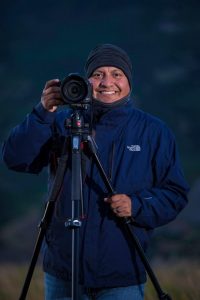
He came to BYU straight from a reservation. He was the first Native American hired by ESPN Magazine. He sparked a controversy in the sports world over the Washington Redskins’ name. Now Eugene Tapahe wants to bring to Provo’s attention another name offensive to Native Americans: Squaw Peak.
“The r-word, which is ‘redskins,’ the s-word, which is ‘squaw,’ and the n-word, which is really bad for black people — those are all in the same category,” Tapahe said. “But we throw ‘squaw’ around like it’s nothing.”
Provo Mayor John Curtis announced at the Provo Women’s Day Lecture Series in March that his department is in the beginning stages of changing the name of the Provo peak because “squaw” is a derogatory term for Native American women.
The name-change committee includes Provo Mayor’s Office Media Specialist Courtney Kendrick, BYU Native American literature professor Michael Taylor and Meredith Lam, a member of the Navajo tribe and director of American Indian Education for Provo City School District.

Origin story of Squaw Peak’s name
John W. Van Cott said in his book “Utah Place Names” the origin of Squaw Peak’s name comes from a tragic event.
A conflict occurred between Indians and white settlers near the Provo River in February 1850, according to Van Cott. Local Paiute Indian chief Big Elk was killed in the encounter, and “his squaw fled with others toward the foothills to the east.” While fleeing, she fell from the peak and died.
Other historians tell different variations of the story, including an alternative ending where the woman jumped off the cliff to be with her lover.
Tapahe said the story of Squaw Peak does not come from native records.
“To me it sounds like folklore,” Tapahe said. “It sounds almost Disney-like.”
Offensiveness of the word ‘squaw’
Lam said many people don’t know why “squaw” is such a bad word.
“Basically, it’s the most private part of a woman,” Lam said.
Taylor said landmarks named “squaw” are connected to a long history of violence and discrimination against native women.
“It’s a horrible depiction of Native American women as a sexualized other,” Taylor said.
Taylor said there is a long history of targeting Native American women as sexual objects with no prosecution.
“They dehumanize the woman rather than prosecuting the man,” Taylor said. “Many see it as very derogatory and offensive and are saddened that people look at the mountain and are reminded of ongoing colonial violence against women.”
Kendrick said Curtis visited many Native American women in Provo while considering initiating a name change.
Tapahe said taking action is hard for natives because they are small in number and their voices aren’t as loud as other minorities. Native Americans account for less than one percent of Provo’s population, according to the U.S. Census Bureau.
But Tapahe said the issue over Squaw Peak’s name should not be ignored because of Native Americans’ small numbers.
“If only a handful of Native Americans feel that the word ‘squaw’ is derogatory, dehumanizing, a slur or whatever, that should be enough for the name to be changed,” Tapahe said.
Changing the Name
The committee’s efforts are the first time formal steps have been made to change one of more than 80 landmarks in Utah with “squaw” in its name.
Kendrick said the committee’s hope is to rename the peak to a Native American woman’s name.
“We’re really looking forward to this process and think it will be a good change for Provo,” Kendrick said.
Taylor said this spring and summer he will act as a mentor over two BYU student interns whose primary purpose will be to collect Native narratives about what “squaw” means.
Curtis said although Squaw Peak is in Provo, the federal government owns the property and would have to decide whether to change the name.
Curtis said Provo’s efforts will not guarantee a name change.
Increasing understanding
“The more we know about each other, the less likely you are to offend somebody,” Lam said. “This doesn’t just apply to Utahns — it can apply to all Americans.”
Tapahe said when he began working for ESPN, his coworkers would ask him ignorant questions.
“I had people asking me if I lived in a teepee in 1999,” Tapahe said. “They were naive. They were uneducated. They didn’t know the issues of tribal people.”
Tapahe said understanding Native American culture “just comes down to education.”
Tapahe said some Utah practices are offensive to Native Americans, such as aspects of Boy Scouts of America.
“You have Boy Scouts who are having powwows, and it’s really sad to see them putting war paint on, putting feathers on their heads, wearing war bonnets, making their own costumes and depicting Native people,” Tapahe said.
Listen to the full interview with Meredith Lam
[/vc_column_text][/vc_column][/vc_row]




